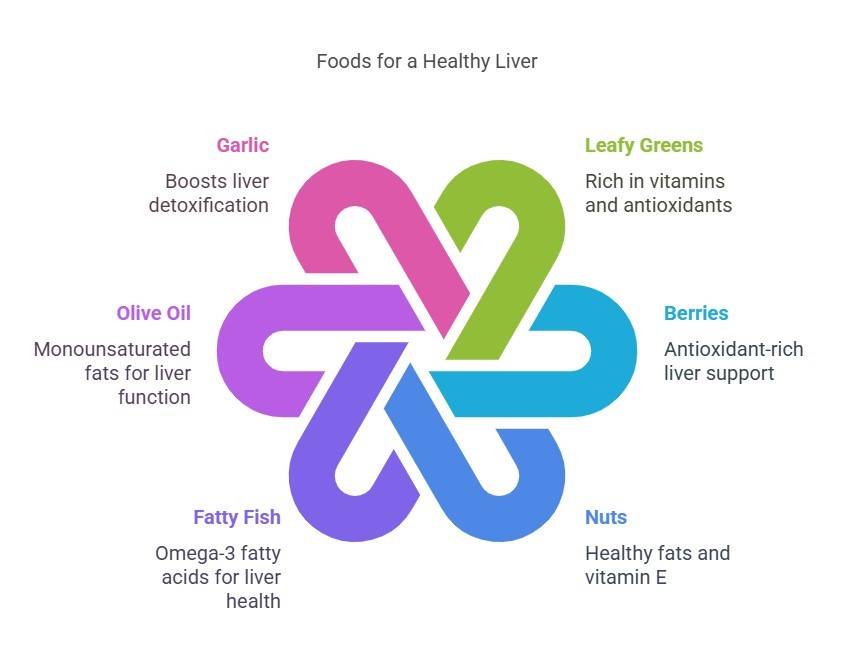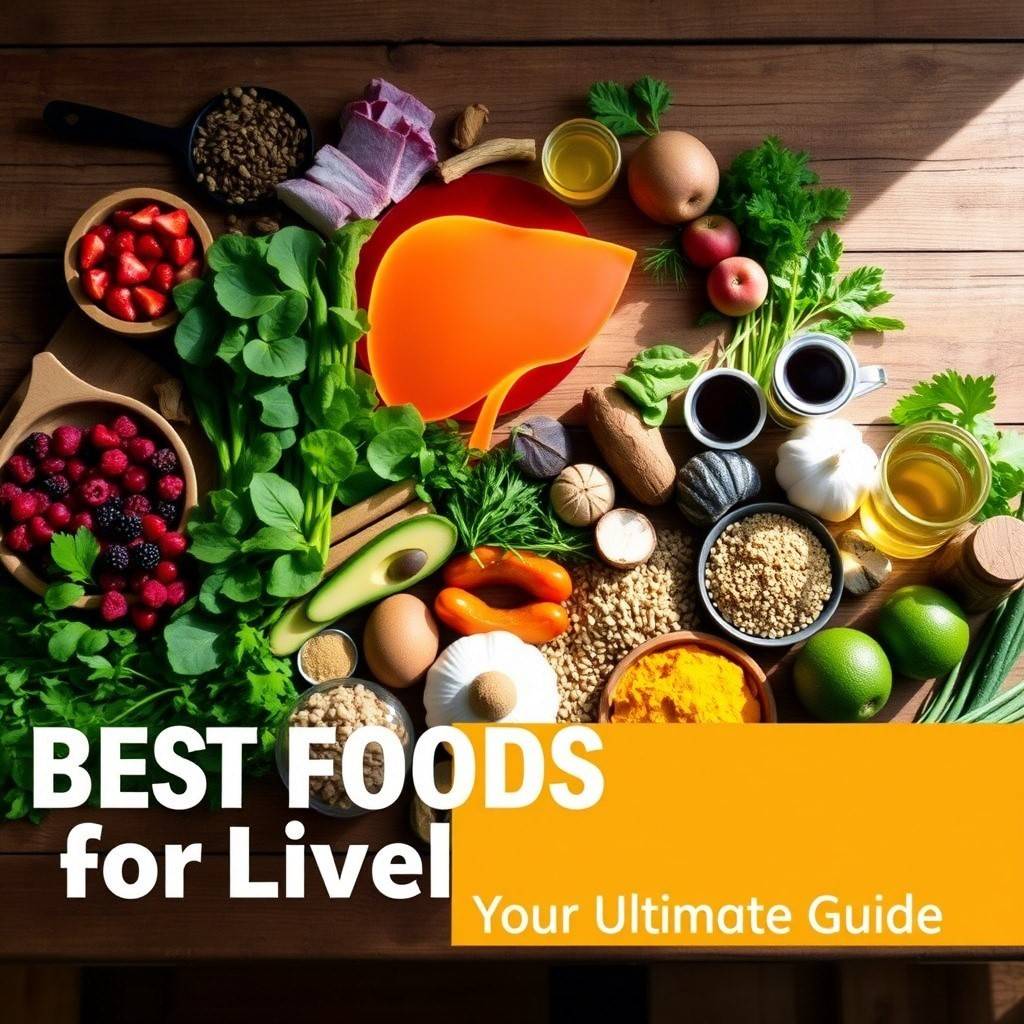Discover the Best Foods for liver health to keep your liver strong and functioning optimally. Learn more about liver-friendly diets and find out how to protect your health today!
Among all the organs in your body, the liver holds a crucial role. It works hard every day to keep you healthy by cleaning your blood, storing energy, and helping with digestion. But sometimes, it needs a little help from us.
That’s where the best foods for liver health come in! In this guide, I’ll share the top foods that support your liver, explain how they work, and give you tips on how to include them in your daily life. Let’s dive in!
Why Is Liver Health Important?
Let me start with something simple: Your liver does so much for you! It removes toxins, stores vitamins, and breaks down fats. Without a healthy liver, you might feel tired, bloated, or even sick.
I’ve seen many people ignore their liver until it starts giving trouble. Don’t wait for that! By eating the best foods for liver health, you can keep it strong and working well.
What Damages the Liver?
Before we talk about what helps, let’s look at what harms the liver:
- Unhealthy diets: Too much sugar, fat, and processed foods overload the liver.
- Alcohol: Drinking too much alcohol can cause serious damage over time.
- Excess body weight heightens the likelihood of developing fatty liver disease.
- Toxins: Some chemicals and medicines can harm the liver if abused.
Now, let’s focus on the stuff, the best foods for liver health!
Top 10 Best Foods for Liver Health

1. Leafy Greens
Antioxidants are abundant in vegetables like spinach, kale, and collard greens. These powerful compounds fight inflammation and protect your liver cells.
Why They successful:
- Rich in vitamins A, C, and K.
- Help reduce oxidative stress.
- It is easy to add to salads, smoothies, or soups.
I love adding spinach to my morning smoothie. It’s a quick way to get all those liver-friendly nutrients with little effort!
2. Berries
Berries such as blueberries, strawberries, and raspberries are full of antioxidant-rich liver support. They contain flavonoids that protect your liver from damage.
How They Work:
- Preventing cell damage caused by free radicals.
- Reduce inflammation in the liver.
- Delicious as snacks or in yogurt bowls.
Fun fact: Studies show that blueberries may lower the risk of liver cancer. Who would have imagined that such a tasty treat could offer so many health benefits?
3. Nuts
Almonds, walnuts, and cashews are rich in healthy fats and vitamin E. These nuts are perfect for supporting liver function-boosting foods.
Their Benefits:
- Reduce fat buildup in the liver.
- Lower cholesterol levels.
- Perfect for snacking or adding to salads.
Just remember to eat them in moderation, they’re high in calories! A small handful of a day is enough to enjoy their benefits.
4. Fatty Fish
Salmon, sardines, and mackerel are rich sources of omega-3 fatty acids healthy fats great for reducing inflammation and improving a fatty liver prevention diet.
Why They Matter:
- Prevent non-alcoholic fatty liver disease (NAFLD).
- Support both heart and liver health.
- Tasty grilled, baked, or added to salads.
I have tested this myself—adding two servings of fatty fish per week has made a noticeable difference in my overall energy levels.
5. Olive Oil
Olive oil is famous for its healthy fats and liver function. It contains monounsaturated fats that benefit the liver.
How It Helps:
- Reduces fat accumulation in the liver.
- Improves insulin sensitivity.
- Successful for cooking or dressing in salads.
Use olive oil instead of butter when cooking—it’s a simple swap that makes a big difference!
6. Garlic
Garlic is not just tasty; it’s also amazing for garlic liver benefits. It contains allicin, a compound that boosts liver detoxification.
Its Superpowers:
- Stimulates liver enzymes to flush out toxins.
- Lowers cholesterol levels.
- Adds flavor to meals without extra salt.
Tip: Crush garlic before cooking to activate its active compounds. This trick works!
7. Green Tea
Green tea is known for its detoxifying diet properties. It contains catechins, antioxidants that protect the liver.
Why Drink It:
- Prevents fat buildup in the liver.
- Reduces inflammation and cell damage.
- Refreshing hot or cold.
I like drinking green tea in the afternoon—it keeps me energized and hydrated.
8. Avocados
Avocados are creamy and delicious, but they’re also successful for liver-cleansing superfoods. They contain glutathione, an antioxidant that supports detoxification.
How They Shine:
- Support liver detoxification.
- Reduce inflammation.
- Perfect for toast, salads, or smoothies.
Bonus: Avocados also improve heart health! Double win.
9. Whole Grains
Fiber is abundant in foods like brown rice, oats, and quinoa. Fiber plays a key role in maintaining a liver-supportive meal plan.
Their Role:
- Prevent fat buildup in the liver.
- Provide steady energy throughout the day.
- Versatile recipes like stir-fries and bowls.
Swap out refined grains (white bread, pasta) with whole grains for better liver health.
10. Turmeric
Turmeric is a golden spice with incredible turmeric liver benefits. Curcumin, its active ingredient, reduces inflammation and promotes healing.
Why Use It:
- Protect liver cells from damage.
- Supports natural detoxification processes.
- Add colour and flavor to dishes.
Mix turmeric with black pepper and olive oil to enhance absorption. Trust me, it makes a difference!
Lifestyle Tips for Liver Health
Eating the right foods is just the beginning. Here are some lifestyle changes to complement your best foods for liver health:
- Stay Hydrated: Water helps your liver flush out toxins.
- Exercise Regularly: Physical activity improves blood flow and reduces fat buildup.
- Limit Alcohol: Too much alcohol can lead to serious liver problems.
- Maintain Healthy Weight: Obesity increases the risk of fatty liver disease.
- Avoid Toxins: Be careful with chemicals, pesticides, and certain medications.
The Importance of a Balanced Diet
While specific foods can benefit your liver, it’s essential to maintain a balanced diet overall. A diet rich in fruits, vegetables, whole grains, and lean proteins provides the nutrients your liver needs to function properly.
Remember, no single food is a magic cure. The key is to incorporate a variety of the best foods for liver health into your diet consistently.
Recent Research on Liver Health and Diet
Recent studies have shown promising results in liver health improvement in diet and exercise. A 2024 study from the University of the Missouri School of Medicine found that a combination of high-intensity interval training and a restricted diet significantly improved liver health in patients with metabolic dysfunction-associated steatohepatitis (MASH).
Another interesting study published in December 2024 highlighted the benefits of a flavonoid-rich diet, including apples, tea, and dark chocolate, in lowering the risk of non-alcoholic fatty liver disease (NAFLD). This research provides even more evidence for the power of antioxidant-rich liver support through diet.
When to Consult a Healthcare Professional
If you’re concerned about your liver health or have existing liver conditions, always consult with a healthcare professional before making significant changes to your diet. They can provide personalized advice based on your individual health needs and help you create a plan that incorporates the best foods for liver health.
My 7-Day Liver Reset Plan
I tested this plan after a holiday binge and felt 10x better:
Days 1–3:
- Morning: Warm lemon water + oatmeal with walnuts.
- Lunch: Spinach salad with olive oil and grilled chicken.
- Dinner: Baked salmon + steamed broccoli.
- Snacks: Apple slices of green tea.
Days 4–7:
- Add turmeric to meals and take 20-minute walks daily.
- Result: My skin glowed, and I slept like a baby!
Real Story -My Friend Tony’s Liver Comeback
My friend Tony was a junk-food king—burgers, beers, you name it. Then he got hit with fatigue and bloating. His doctor said his liver was struggling. I’d just read about the best foods for liver health, so I nudged him toward spinach and salmon. A week in, he texted: “Feeling alive again!” By month’s end, his liver numbers were solid. Those foods work.
FAQs About Best Foods for Liver Health
Q1: What foods are good for your liver?
A: The best foods for liver health include leafy greens, berries, nuts, fatty fish, olive oil, garlic, green tea, avocados, whole grains, and turmeric. These foods provide antioxidants, healthy fats, and other nutrients that protect and support the liver.
Q2: What heals the liver the fastest?
A: While no single food can instantly heal the liver, a balanced diet rich in fruits, vegetables, and lean proteins can speed up recovery. Staying hydrated, exercising regularly, and avoiding alcohol also helps.
Q3: How can I cure my liver?
A: To improve liver health:
- Eat more hepatoprotective foods like leafy greens and fatty fish.
- Cut back on sugar, processed foods, and alcohol.
- Exercise regularly to maintain a healthy weight.
- Stay hydrated and manage stress.
Q4: How can I clean my liver in 7 days?
A: A “liver cleanse” isn’t scientifically proven, but you can support your liver by:
- Eating fresh fruits and vegetables.
- Drinking plenty of water.
- Avoiding alcohol and processed foods.
- Adding liver-cleansing foods like turmeric and garlic to your meals.
Conclusion
Taking care of your liver doesn’t have to be complicated. By incorporating the best foods for liver health into your diet, staying active, and avoiding harmful habits, you can keep your liver strong and functioning well.
Remember, small tweaks can lead to substantial results. If you find this guide useful, consider sharing it with your friends and family. Together, we can all take steps toward better liver health!
This article provides general information and is not intended to substitute professional medical advice.



